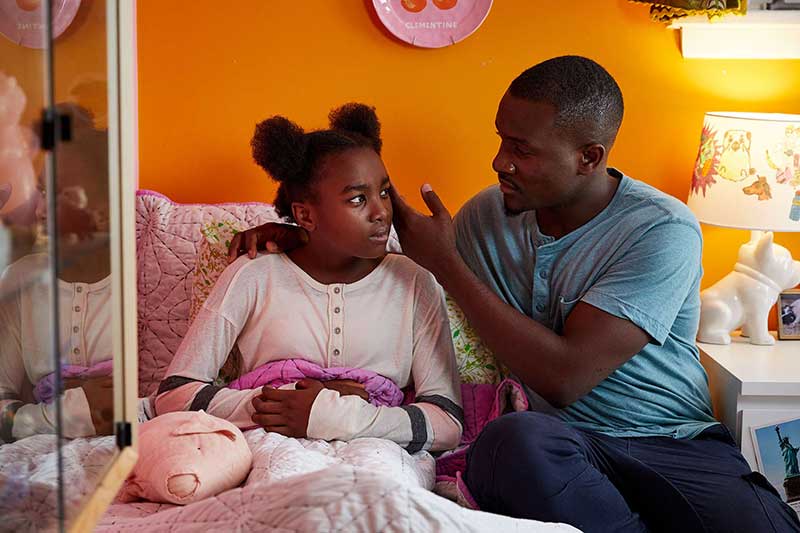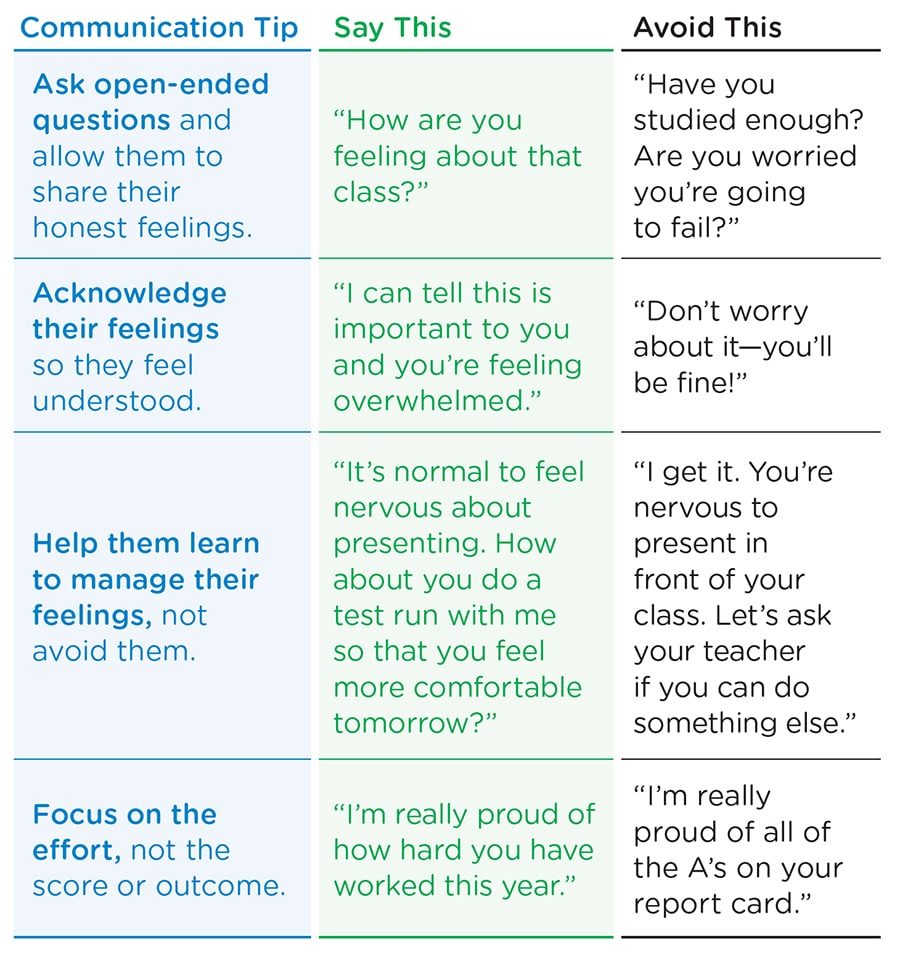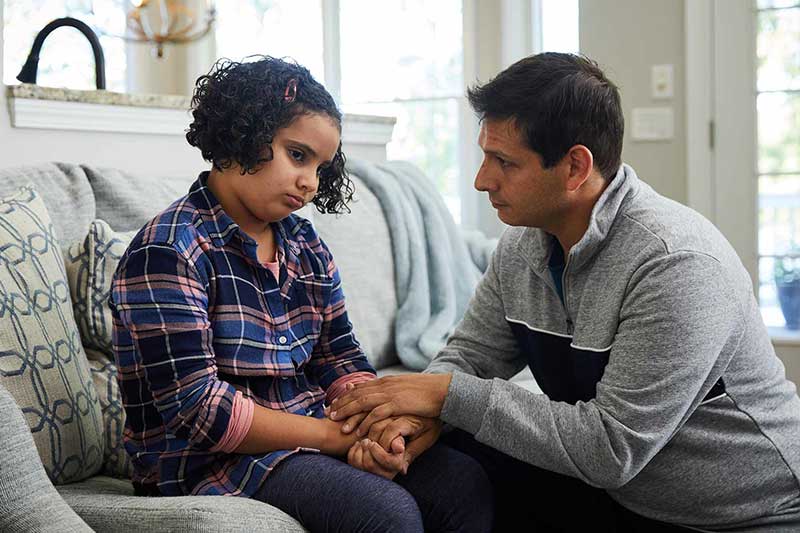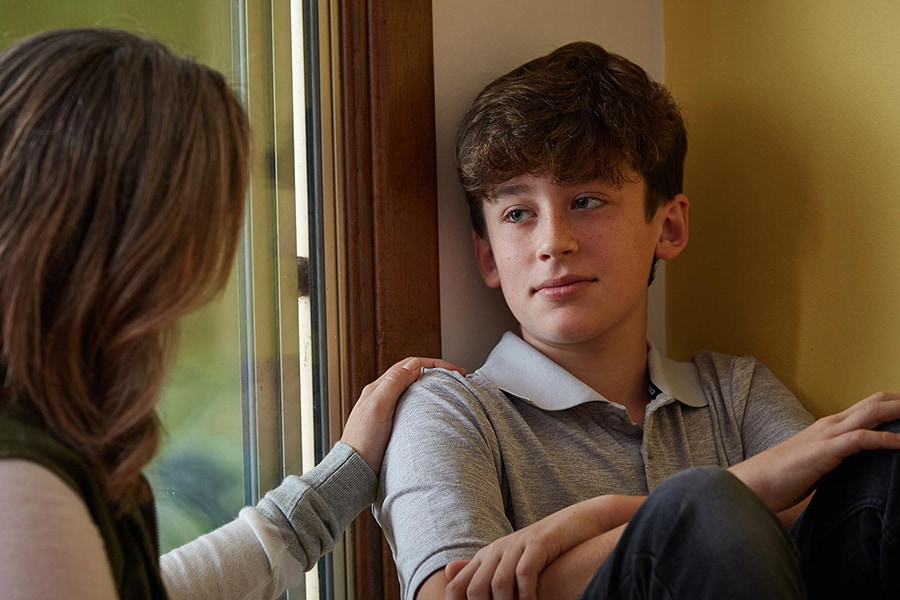How to Help Your Child Deal With Academic Anxiety
Has your elementary schooler come home worried that if they don’t pass their milestones test they won’t move on to the next grade? Is your middle schooler already worried about getting into college or basing their whole identity on being a star student?
Some school-related anxiety is normal—and helpful. It gives kids a little healthy worry that will hopefully motivate them to study for tests, complete homework on time and focus on schoolwork. But how can you tell when that stress has gotten out of control? And how do you ease it while still encouraging your child to achieve? Read on for expert tips.
In this article:

Signs of academic anxiety
Kids don’t always tell you how they feel or show anxiety in obvious ways, and behavior is one way kids communicate.
Look out for these signs of academic anxiety in your child:
- Complaining of frequent stomachaches, headaches or other physical pain with no known medical cause
- Avoiding school or certain classes (e.g., refusing to get dressed or trying to miss the bus)
- Worrying excessively about school and no longer making time for activities they used to enjoy, including social interactions.
- Showing changes in sleep or eating habits
- Showing changes in mood, such as appearing to be “on edge,” irritable, or tearful
- Acting out in class (e.g., being the class clown, getting in fights or talking back)
- Having an “I don’t care” attitude about anything related to school
- Sweating, shaking or fast breathing when thinking or talking about school
Talking to your child about academic anxiety
It’s natural to want to help kids feel better when they are stressed, but sometimes even the best intentions backfire. By attempting to fix the problem without acknowledging their feelings, kids can end up feeling worse while getting the message that their feelings are not OK. Here are some helpful ways to respond:


Overcoming academic anxiety in the moment
What can kids do when they find themselves worrying excessively about an assignment, or feeling short of breath as a teacher passes out a test? Walker suggests kids learn a couple of simple coping strategies. “It’s important for kids to get a chance to learn and practice these skills in a calm moment, such as at the kitchen table while doing homework, so they will be ready to use them when they feel their anxiety rise,” says Walker.
- Deep breathing: Breathe slowly in through the nose and out through the mouth. Repeat several times
- Progressive Muscle Relaxation: Slowly tense and relax muscles. For example: As you inhale through your nose, tighten the muscles in your hands by pretending you are squeezing a lemon.. Hold for a few seconds. Now, imagine letting go of the lemon and allowing your muscles to relax, as you exhale slowly through your mouth.
- Grounding: Take a few deep breaths, and then use your senses to notice things. For example: Notice 3 things you can see around you, 2 things you can touch or 1 thing you can hear, etc.
Download a deep breathing tip sheet.
Download a progressive muscle relaxation tip sheet.
Download a grounding tip sheet.
Download a list of coping skills.

Overcoming academic anxiety in the long run
Here are some ways you can give your child a healthy outlook on school and help them manage school-related stress.
- Practice healthy habits as a family. Healthy habits have a positive impact on both the body and mind, and they help reduce stress. Encourage the whole family to prioritize getting enough quality rest, eating well and being active.
- Encourage balance. Encourage children to explore other interests and hobbies so that school is not their only focus.
- Make time for play. Like adults, kids need unstructured time to play, unwind, be creative and relax. Taking breaks and being active can reduce stress.
- Be a positive role model. Your child still looks to you as an example, and if they see you managing stress in healthy ways they are more likely to do the same. For example: “I feel stressed about a big work deadline, but I know I will feel better if I take a break to go for a walk. Would you like to join me?”
- Teach your child how to study smarter. Knowing how to properly study, and be organized, can help reduce anxiety.
- Break big assignments up into smaller, more manageable pieces.
- Find a quiet space and remove distractions (such as the TV, phone, etc.).
- Use a planner to help with time-management.
When to seek help or support for academic anxiety
Some amount of school-related anxiety is normal and to be expected for most kids (at some point in their lives). If you are ever concerned your child may be experiencing symptoms of anxiety that go beyond what is normal and manageable, or you have other concerns about their emotional wellness, talk to your child’s pediatrician, their school counselor or a behavioral and mental health professional about additional support that may be available.




